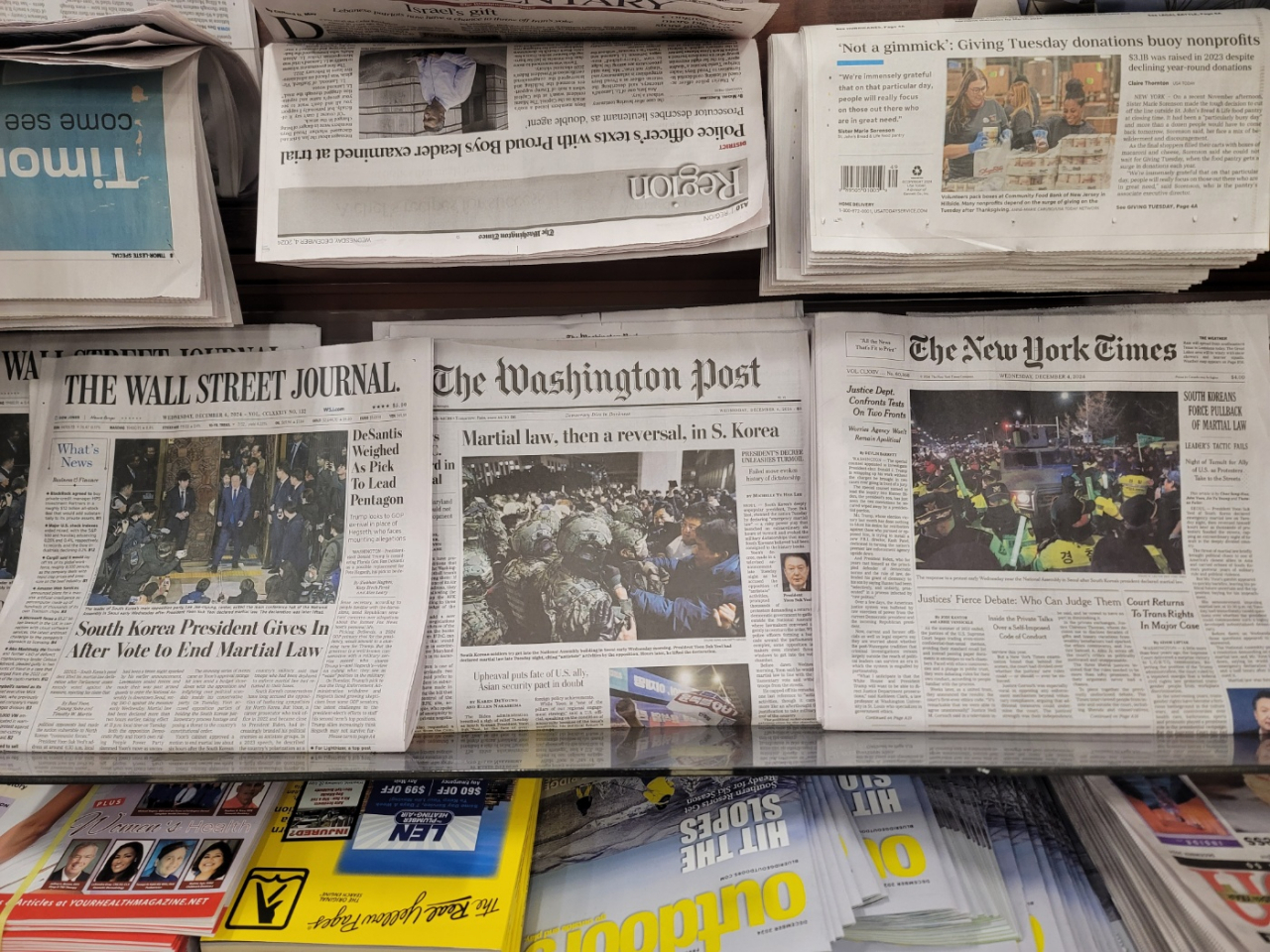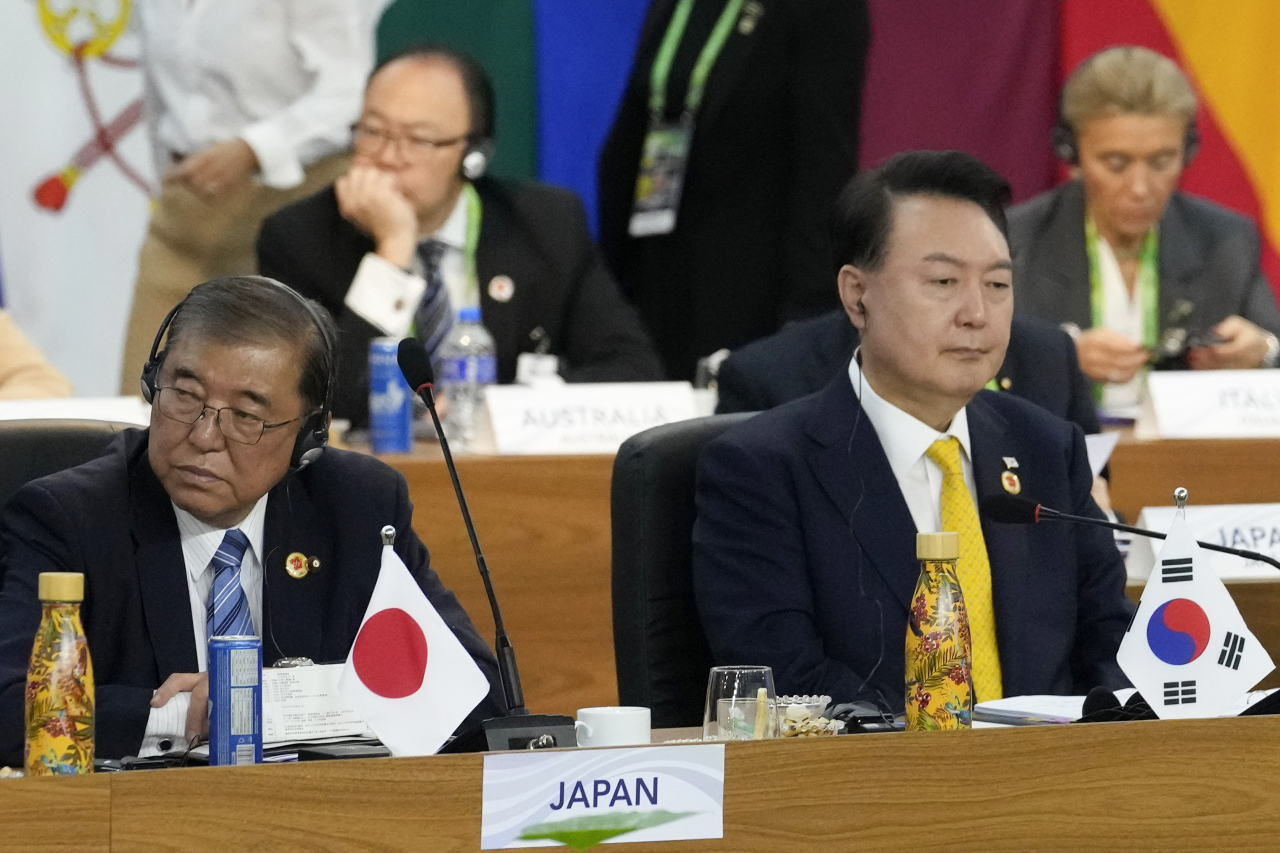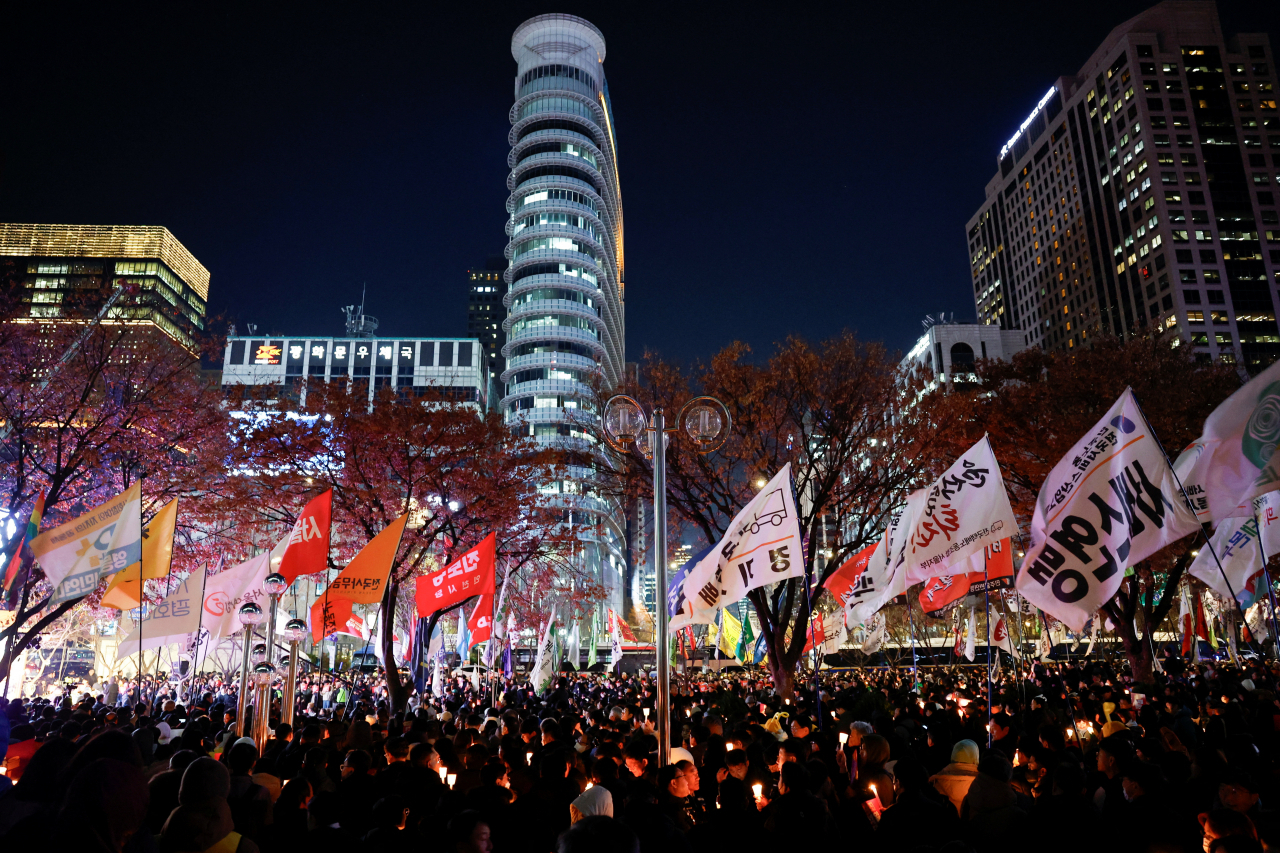 |
Major US daily newspapers feature South Korean President Yoon Suk Yeol's declaration of martial law on the front pages of their Wednesday editions, displayed at a newsstand in Virginia. (Yonhap) |
South Korea's diplomatic and security activities have been thrown into disarray following President Yoon Suk Yeol's abrupt and fleeting declaration of martial law, which has prompted the cancellation of visits by foreign delegations.
The paralysis in South Korea's foreign and defense affairs is poised to intensify with the resignation of now-former Defense Minister Kim Yong-hyun on Wednesday, formally accepted by Yoon the following day, and the voluntary departure of Foreign Minister Cho Tae-yul, who has tendered his resignation.
South Korea's Defense Ministry confirmed that the defense ministers' meeting with Kazakhstan originally set for Thursday has been canceled, following Defense Minister Ruslan Zhaksylykov's decision to forgo his visit to Seoul.
Seoul and Washington have postponed the meeting of the Nuclear Consultative Group and the inaugural NCG tabletop exercise, which were set to take place in Washington on Wednesday and Thursday. The NCG was widely anticipated to be the final meeting under the outgoing Biden administration.
The declaration of martial law late Tuesday night also occurred during the visit of Kyrgyz President Sadyr Japarov, the first Kyrgyz leader to visit South Korea in 11 years, who was in Seoul for a two-day trip scheduled for Tuesday and Wednesday.
The Kyrgyz delegation had to adjust their schedule to focus only on essential events. When asked about any formal protests regarding the situation, South Korea’s Foreign Ministry declined to comment directly, stating only that diplomatic communications were ongoing.
Diplomatic leaders have postponed their planned visits to Seoul amid the political uncertainty. Swedish Prime Minister Ulf Kristersson announced on Wednesday the cancellation of his trip to South Korea, which was set to begin Thursday, citing the unfolding political situation.
 |
Japan's Prime Minister Shigeru Ishiba (left) and South Korea's President Yoon Suk Yeol attend the G20 Summit leaders meeting in Rio de Janeiro on Nov. 18, 2024. (AP) |
Yoon's declaration of martial law is likely to have an inevitable and adverse impact on Seoul-Tokyo relations.
Japanese Defense Minister Gen Nakatani's trip to South Korea, which he agreed to undertake before the end of the year during the Korea-Japan bilateral defense ministerial meeting in November, now seems highly unlikely amid ongoing political turmoil.
Should Nakatani's visit take place, it would be the first by a Japanese defense chief to South Korea in nine years.
Former Japanese Prime Minister Yoshihide Suga, who chairs the Japan-Korea Parliamentarians' Union, has canceled his planned two-day visit to Seoul, originally scheduled for Dec. 15, Kyodo News reported on Wednesday.
Kyodo also reported that Prime Minister Shigeru Ishiba’s potential visit to South Korea, which Japanese media had indicated was under consideration for January next year to mark the 60th anniversary of diplomatic normalization, could be impacted, citing an unnamed senior official from Japan’s Foreign Ministry.
First Vice Foreign Minister Kim Hong-kyun cut short his Europe trip, canceling the first in-person Korea-Spain Strategic Dialogue since 2019, which was to be held in preparation for the 75th anniversary of diplomatic ties. Second Vice Foreign Minister Kang In-sun also canceled her UAE visit, planned for the Korea-UAE High-Level Consultation on Nuclear Cooperation.
 |
People attend a candlelight vigil condemning South Korean President Yoon Suk Yeol's surprise declaration of martial law last night, which was reversed hours later, and to call for his resignation, in Seoul, South Korea, on Wednesday. |
The Yoon administration appeared to be making efforts to portray his martial law declaration as lawful while emphasizing South Korea's stability, amid mounting international criticism.
A presidential official, on condition of anonymity, said in a statement for foreign media that all actions were "taken in accordance with the Constitution," defending Yoon's move as a measure "to protect the Constitutional order based on freedom and democracy against groups determined to destroy the Constitutional government."
The Foreign Ministry in Seoul announced Thursday that it has sent diplomatic notes to all foreign embassies in the country on Wednesday to provide a detailed explanation of South Korea's return to normalcy and stability following Yoon's revocation of martial law.
The notes outlined the democratic process through which martial law was lifted, emphasizing the maintenance of public safety and order, the robustness of the economic foundation as reflected in the unchanged credit rating from S&P Global Ratings, and the stability of the security environment, with no unusual activity observed from North Korea.
"Therefore, we request that home countries be informed that no measures, including adjustments to travel advisories for South Korea, are necessary, given that daily life remains unaffected and there are no disruptions to tourism or economic activities," the ministry's spokesperson, Lee Jae-woong, said during an on-camera briefing.